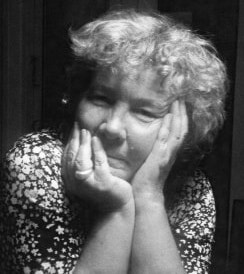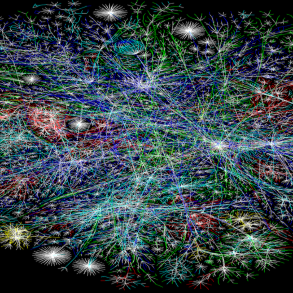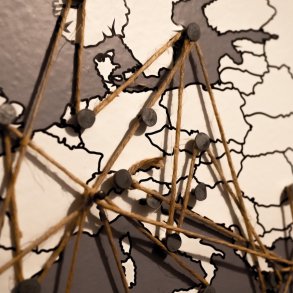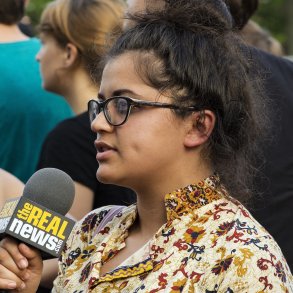By Lise Damkjaer for Enlivening Edge Magazine
Lise will be the storyteller for Nov. 3 Enlivening Edge Community Conversation. Register now to receive access information and discover the joy of meaningful dialogue with fellow transformationalists.
Co-creating is a buzzword among innovators bringing the next stage of consciousness into organizations. Since most people don’t have relevant experiences to draw from in knowing how to go about doing this, the following experiences are meant to offer some help.
For nearly 2 years I have been in what we call “the CoCreation-group.” We include Morya Short and Sarah Stanyer from UK, Christine Samuel from Canada, Joanna Staniszewska from Poland and myself: Lise from Denmark. Marie Örnesved from Sweden came up with the idea and helped me form the group.
When we started, meeting weekly, we wanted to “CoCreate a book about CoCreating”. It has been marvelous. Early in our process we figured out that CoCreation is not only about creating together with colleagues, share- and stakeholders—it is much more about creating together with LIFE. To me as a Christian I see CoCreation as creating together with God instead of working against Him. Working together with LIFE makes our life and work much more ease-ful. How might it be possible? How might it look?
TEAL consciousness in organizations, as described in Frederic Laloux’s book Reinvening Organizations, is largely about evolutionary purpose, self-management, and wholeness.
As it turns out, CoCreation is changing our understanding of wholeness. Also, it takes inner work into the organizational context—inner work might be a better way to achieve our purpose. Our own purpose and the purpose of the organization. CoCreation is very much about consciousness.
In the group we started every session with a short check in and 3 minutes of meditation. Then we agreed on a curiosity question for the day: How might CoCreation feel like? How can we CoCreate our future? Sometimes we asked even more practical stuff like: How might our book about CoCreation emerge?
By turn we each reflected on the curiosity question, everybody else listening. Especially listening for what wanted to emerge. Very interesting. I imagined us standing around an elephant (we called it CoCreation) and each telling as honestly as possible how the elephant looks and feels like from our perspective. At the same time listening and imagining what the unknown “elephant” could be like.
It is not as easy to be honest as I thought. To dare to tell when I am annoyed by the question, to dare to tell my deepest longing or to tell if I don’t have any hope. I certainly resonate with calling the experience “another darn learning opportunity.” Listening to the different perspectives and not arguing against them was difficult, when we started—now it is natural.
I don’t see much disagreement any more—I see different perspectives on something unknown and get curious: What do we learn about the elephant from the different perspectives?
At some point I concluded that I would try to change my way of being a consultant into being a CoCreator. I have never been “the expert” sort of consultant; I have been facilitating in different ways. As a consultant I phoned somebody to sell my services. I would ask for a meeting and tell them about my excellent results with facilitating dialogue, meetings, and processes, and try to convince them to hire me.
Then they would tell me about the change or the results they wanted to implement and I would promise to implement them or tell them about the different methods I would recommend to achieve them. Then we would do the workshops and something would happen.
But I would have to work hard to manage the resistance against change—and maybe we had to admit that the results were not quite achieved. A bit of disappointment from everybody. I wanted to make it different—using what I learned from CoCreation.
I started out phoning a woman I already knew a bit. She is the development director in an educational institution. I told her about CoCreation and said that I would like a meeting with her about whether CoCreation could make sense in her context. She agreed.
At the meeting, I asked her for a strong intention, something she really wished and that would be good for her organization as well. And it might seem unrealistic, so that we actually had something to explore. She wanted many more students to fulfill their studies—and I share her wish.
Then we talked about how to do it, and we had some meetings with her group of managers and with the teachers. In these meetings I certainly realized the change in my approach from having been in the CoCreation group.
I didn’t experience disagreements or resistance to change—I only experienced different perspectives! And I was curious and asking more questions about the perspectives, that I often before had experienced as resistance. So easy work! I was amazed.
I also had a meeting with a manager in the Danish engineering association. She works with the work life of engineers. I started out exploring and listening; but it didn’t work! She had no intention, it was just another day at the office. At least she didn’t know her intention so then CoCreation cannot work.
The CoCreation group realized that our talks and exploring had changed each of us. Amazing. So we set out for writing the book. We had done a lot of inner work, and we wanted it to be not only be talking, but some action as well.
BUT. But there was no energy in our writing! We tried to write together in the same document and being on zoom together, but the amazing energy we so often had, had vanished. Then we discovered that the writing had become a burden and that we had taken on the idea that inner work doesn’t matter, if we don’t use it for some external work. To me it was a eye-opening realization!
It seems as if most people–even our CoCreation group–believe that external work is what matters—and inner work only matters when it makes our external results better.
Then we decided not to write any book, but change the world by being us and by keeping up the good inner work!
Now we meet every month to share how our inner change affects the world. Just by being me, I affect the world. By transforming my way of perceive disagreements, I affect the world. By asking my curiosity questions, I affect the world. By listening to what wants to emerge, I affect the world.
Wholeness is more than being allowed to be at work as the whole human being we are. CoCreation show us that our being and being alive, listening honestly to ourselves and letting the listening change us from within helps us to achieve the capability as a group to explore impossible missions. It is a process and might take some time. We have to practice and be patient.
CoCreation is inner work done together. In our time we focus mostly on external work—DO, DO, DO. If we don’t do something, nothing will happen or everything will be chaos— seems to be our belief. It makes work hard. It makes life exhausting. It is a huge load to the planet.
CoCreation might help us to a state of being instead of pushing ourselves and each other to do stuff. When I see and listen to others, they feel seen and heard, and they calm down and have energy to see and listen. Quite easy.
These days we need to wrestle with impossible challenges like climate change, world peace and racism on a societal level and complexity, plus unpredictability and stress on an organizational level. Because the challenges are so big, we assume that the work to solve them has to be enormous, too enormous, and we tend to give up. With CoCreation we are able to change the world, actually serve the world only by our inner work.
CoCreation in organizations
It might be a relief to have our inner work done before the external work begins. What a relief it might be in the organization, when everybody experiences being seen and heard and feels secure to be honest and to listen to what wants to emerge—trying to serve LIFE, trusting that LIFE is not an enemy, but our most welcomed partner, the source in our work and life. What if everybody in the organization felt at ease and didn’t initiate drama, cry for attention, or be too shy to share their longings or ideas?
If we practice our capability to transform disagreements into different perspectives and our ability to be curious, then we can work with the deepest and most “impossible, but necessary” intentions of the organization—talk about any elephant we want. Letting our minds change. Do our inner work together.
What if we don’t need to do as much external work? Maybe cut 50% off. We are not here to bring everything into order —or to control everything. What if we are here to give our gifts, to contribute with our curiosity questions, longings and purpose – to make the world go around nourishing life to each other and to the planet. How would it look in your organization?
We might as an organization explore the bigger questions in life: How do we cocreate world peace? How do we teach our customers to consume less and how do we survive as an organization producing less?
We cannot continuously produce stuff and control each other and the nature. We need to serve LIFE, listen to LIFE.
It might seem a bit strange in an organization to listen to LIFE; we are not familiar with it. But if we don’t, we violate LIFE instead of CoCreating with LIFE.
 Lise Damkjaer, Copenhagen, Denmark. Master of civil engineering. Worked as an engineer in a construction site, study counsellor, HR-development manager.
Lise Damkjaer, Copenhagen, Denmark. Master of civil engineering. Worked as an engineer in a construction site, study counsellor, HR-development manager.
Independent consultant since 2001. Developer of dialogue board games: Projectspacegame.org and Being Human (sorry-only in Danish). www.learning4life.dk
Featured Image by Jill Wellington from Pixabay





Dear Lise, Could not have put it better myself! If anyone would like to see some of the questions we were curious about and some of our thoughts on each question you can go here: https://exbook.shortcoaching.com/
Thank you Lise for this beautiful reflection. Mx